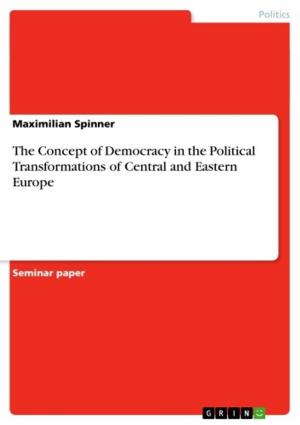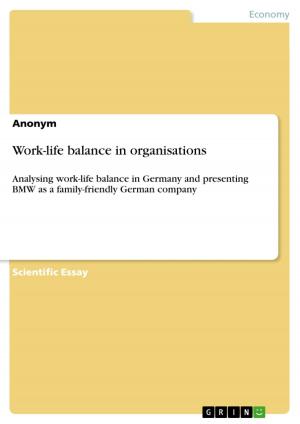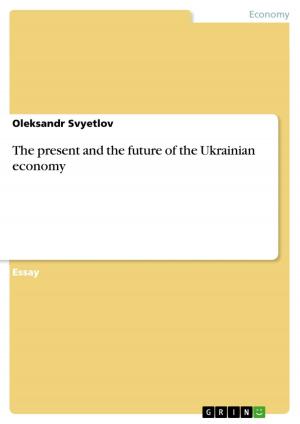| Author: | Maximilian Spinner | ISBN: | 9783638189996 |
| Publisher: | GRIN Publishing | Publication: | May 6, 2003 |
| Imprint: | GRIN Publishing | Language: | English |
| Author: | Maximilian Spinner |
| ISBN: | 9783638189996 |
| Publisher: | GRIN Publishing |
| Publication: | May 6, 2003 |
| Imprint: | GRIN Publishing |
| Language: | English |
Seminar paper from the year 2002 in the subject History Europe - Other Countries - Newer History, European Unification, grade: 1 (A), University of Birmingham (Centre for Russian and East European Studies), course: Graduate Soviet Social and Economic History, 28 entries in the bibliography, language: English, abstract: The collapse of the Soviet Union has been one of the most controversially discussed issues among historians and social scientists throughout the last decade. Paradoxically the imminent collapse of communism had been predicted frequently by Western observers during the early years of the Bolshevik rule. With the victory of the Second World War those voices were muted and the West accomodated with the existence of an obviously stable, mighty and economically expanding country.1 The breakdown of communism in 1991 had been anticipated by few contemporary scholars, although the majority were aware of the symptoms of a deep crisis. In this essay I will argue that in order to better understand the collapse of communism in the Soviet Union, a central role must be given to the economy and its effects on other areas. Most symptoms of the crisis and the ultimate breakdown of the system can in fact be attributed to the impact of economic failure. Whereas, economic modernization was the motor of success in the early decades, the economy became the weakest link of the Soviet system in the later period as its structural shortcomings deeply effected other areas as well. The first part of this essay is intended to briefly outline the central role the economy played in the development of Soviet socialism. The second part analyses the far-reaching impact of the economic downturn, while the third part discusses the limits of reform before drawing a conclusion.2 1 M Cox, 'Critical Reflections on Soviet Studies', in: M Cox (ed.), Rethinking the Soviet Collapse, L: Pinter, 1998, p 27. 2 The author is aware that in the given scope of this essay only a minor and not necessarily representatitve fraction of the debates and works on the collapes of Soviet Communism can be touched on.
Seminar paper from the year 2002 in the subject History Europe - Other Countries - Newer History, European Unification, grade: 1 (A), University of Birmingham (Centre for Russian and East European Studies), course: Graduate Soviet Social and Economic History, 28 entries in the bibliography, language: English, abstract: The collapse of the Soviet Union has been one of the most controversially discussed issues among historians and social scientists throughout the last decade. Paradoxically the imminent collapse of communism had been predicted frequently by Western observers during the early years of the Bolshevik rule. With the victory of the Second World War those voices were muted and the West accomodated with the existence of an obviously stable, mighty and economically expanding country.1 The breakdown of communism in 1991 had been anticipated by few contemporary scholars, although the majority were aware of the symptoms of a deep crisis. In this essay I will argue that in order to better understand the collapse of communism in the Soviet Union, a central role must be given to the economy and its effects on other areas. Most symptoms of the crisis and the ultimate breakdown of the system can in fact be attributed to the impact of economic failure. Whereas, economic modernization was the motor of success in the early decades, the economy became the weakest link of the Soviet system in the later period as its structural shortcomings deeply effected other areas as well. The first part of this essay is intended to briefly outline the central role the economy played in the development of Soviet socialism. The second part analyses the far-reaching impact of the economic downturn, while the third part discusses the limits of reform before drawing a conclusion.2 1 M Cox, 'Critical Reflections on Soviet Studies', in: M Cox (ed.), Rethinking the Soviet Collapse, L: Pinter, 1998, p 27. 2 The author is aware that in the given scope of this essay only a minor and not necessarily representatitve fraction of the debates and works on the collapes of Soviet Communism can be touched on.















